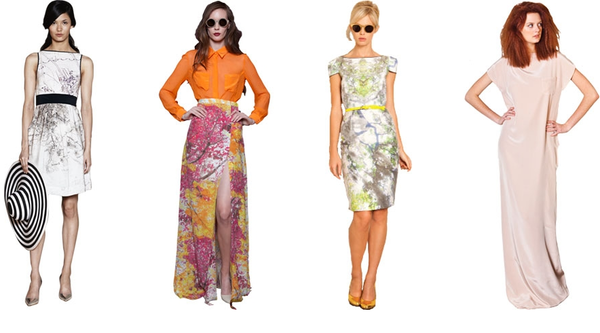(NEW YORK) The latest name to know on the sustainable fashion scene has been in the eco game for a briefer period than many green-washed outfits, but is off to a chicly promising start: Houston-based CrOp by David Peck has implemented sustainable practices for the production of frocks and bridal wear. Plus, it’s all manufactured locally in designer David Peck’s own factory. How’s that for homegrown?
BY RACHEL BERNSTEIN
How did CrOp by David Peck come about?
We’ve been in business for about two and a half years. It started as a very small collection of dresses—we’ve expanded, so now we have a wholesale collection, which is sold nationwide and internationally, and we also we have a showroom in Houston where we do a lot of custom eveningwear and bridal. We have a manufacturing facility—not only do we produce CrOp, but we also manufacture for a few local designers as well as nationwide childrenswear companies.
Why are you situated in Texas?
I’m not originally from Houston, actually. I grew up in Santa Fe and then Colorado. When I moved to Houston, I thought my fashion career was over! That was one of the impetuses for starting the factory and also doing something a bit more unexpected or unusual just because there wasn’t as much available here.
What is the most Texan thing about you?
Oh goodness, there’s a lot that’s Texan about me! Houston is really an international city; of all the places that I’ve been to in Texas, it feels the least Texan. But the one thing that I really appreciate—which is a very Southern thing—is the hospitality, and that people genuinely want you to succeed. If you have a good idea and you present it well, people really get behind you; that’s helped me grow my business so quickly.
How do Texan lasses tend to shop?
A lot! They love to shop. They very much shop for the occasion. A lot of them are involved in charities,, and they’re really active in their local communities; they have specific places to go. That really helps in terms of defining the collection.
How’s the brand been growing recently?
Besides out factory, which is now centrally located and much bigger than it was before, we’ve opened a new showroom to entertain clients and do more with our custom and bridal. Bridesmaids will pick out our dresses, then we end up dressing the mother of the bride or the mother-in-law. That business has really started to take off. We have brides from all over the world: We’ve done a couple brides in Paris, and even Africa!
Do you offer anything for the lads?
I would really love to! Right now, we do pocket squares and bowties for men in the season’s prints. It’s not a full line, but we do offer a little something for the guys.
You employ and train local Houston women to work in your factory. What’s the story?
I worked with a woman who had a local children’s wear and uniform factory, to develop and train sewers—Houston has a huge immigrant population and a lot of people who are looking for work. Our network has grown as a result, because we really take the time to train our employees. They come out of it with a new set of skills that they didn’t have when they started the job.
How’d you decide to go the sustainable route?
When I started working in the fashion industry in Paris, I saw the incredible craftsmanship that went into making timeless clothes—but I realized how much waste resulted from the production of mass market goods. I got interested in how technology and innovations could change the way the industry worked. All of our cotton is organic; we also work with a lot of fair trade cooperatives around the world where we commission specialty woven fabrics that are custom for us and they’re woven by women in their homes, who are able to take care of their children and earn a fair wage. We’re putting back into the local economy: when something’s happening closer to home, you’re more conscious and aware of the effect that it has.
Any other ways that you’re particularly eco-minded?
We’ve donated a lot of our leftovers, especially cottons, to local quilting circles. They’ll also take the scraps and patch them together to make blankets for for people in need. We’ve also started working on collaborations with other designers who want to use the scraps.
What does the future of sustainable fashion look like?
I don’t know if the general public truly understands the impact that negligent manufacturing practices can have. There still aren’t resources available to designers who want to do things sustainably!
Are there other industries besides fashion that are keener on sustainable matters?
The food industry’s done a really good job of raising awareness about organic food and eating locally. As they become more aware of what they’re putting in their bodies, they start asking questions about where their clothes come from, who made them, and how they were made.
Where is CrOp sold right now?
By the time fall hits, we’ll probably have close to 50 stores nation-wide. We have a store that is carrying us for the first time in Finland; we’re also carried in Saudi Arabia.
Where do you hope to widen the breadth of CrOp’s circle of retailers?
I would love to have more stores in California; L.A. and San Francisco would be really great places for the collection. We’ve focused a lot on specialty boutiques and regional department stores, other than huge department stores, because our story needs to be told more personally.
Who’s your industry role model?
When I was getting my first degree in music, I started working at Ralph Lauren—I ended up doing windows there. It was the first job that made me realize I could perhaps have a career in fashion. I’ve always admired [Ralph’s] business sense and the way he’s created an entire lifestyle out of nothing. He created a world that never really existed before!
And your muse, s’il vous plait?
I’ve always had a big crush on Gwyneth Paltrow. In terms of designers, I think that what Raf Simons has done at Jil Sander and then Dior is such a modern approach to couture that seems very relevant right now. It’s a really fine balance between craftsmanship and conceptual ideas. It would be really fascinating to pick his brain or work with even a bit of the resources that are at Raf’s disposal!
Great picks! What’s your growth strategy for CrOp?
For now we’re taking it one day at a time, but we’ve seen so much growth in our direct sales especially starting locally. I see us eventually opening our own lifestyle store based on the concept of our showroom here in Houston.

